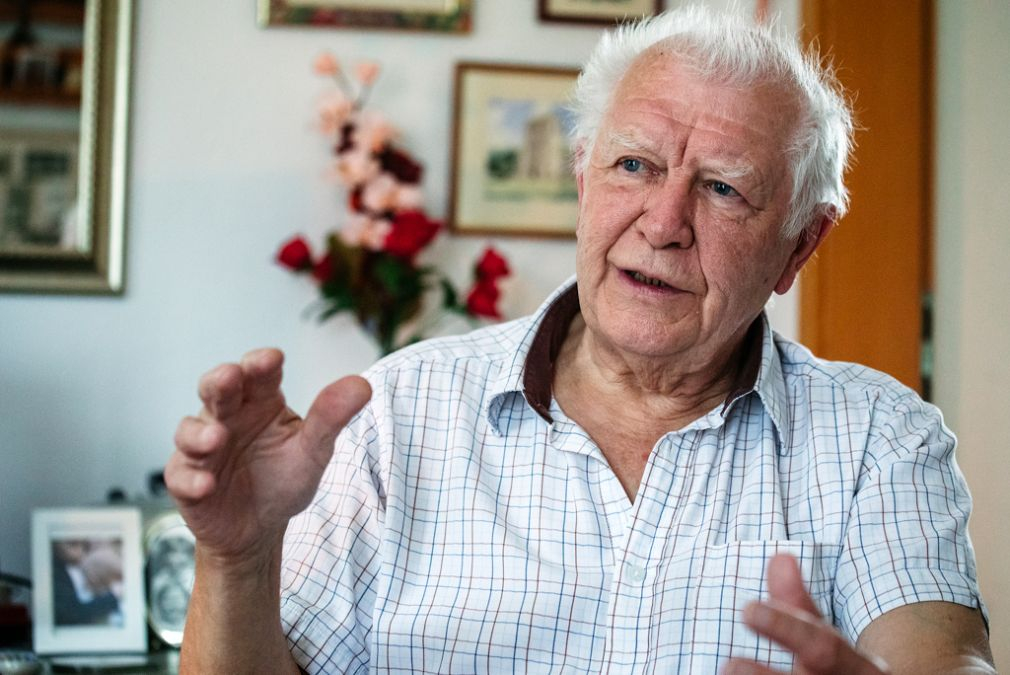Most of us at some time have fear, and it can be a good thing because we are more cautious when we cross a road or when in an area where there are dangerous wild animals. This sort of fear makes us take care. Also we have a certain fear in a free market system that we may lose our job and so we as the saying goes ‘save for a rainy day, and are more responsible employees. Freedom to act and speak goes with being naturally careful. It is a fear associated with natural uncertainty.
We use many words for fear to show the various types and degrees- awe, alarm, dread, menace, apprehension, anxiety, fright, panic, worry, dismay, consternation and terror. (strah, bojazen, groza, zaskrbljenost, panika, teror).
But when we live in a totalitarian or autocratic state fear is something else. Because the dictators believe that ‘the end justifies the means’ in these states fear is used to keep total control. Extreme terror is the norm at the start of the takeover of power by these regimes but this lessens over time as complete control of society by one party is achieved. These regimes once believed that they would bring economic prosperity so that ‘bread and circuses’ would stop any demand for freedom, and therefore fear tactics would not be necessary any more. It was a mistake in expecting communist and other totalitarian regimes would bring prosperity, so fear in some form had to continue and thus it never disappeared. In particular this was needed because these regimes cannot allow independent societies,real dissent, or completely free speech, or free access, and expression of alternative views.
So in totalitarian regimes there is a fear to speak freely , to think freely, to write freely, and to act freely. Imposing silence is often the methodology of the dictatorship. The fear that was terror in the early days of a totalitarian regime that was related to the threat of death, or torture, or a beating turned later into a threat of job loss, no promotion, no bank home mortgage, no further education, travel restrictions, no access to specific goods and so on. Plurality of opinion is negative for such regimes and non-conformity had to be eliminated so that even the arts had to be controlled. Eccentricity was seen to be almost a mental illness and any balancing of views was counter-productive.
Unfortunately these tactics have carried over in some respects in post communist regimes and also have developed in so-called liberal democracy. In the traditional democratic countries there has been an erosion of freedom in many ways. Some of it by the tactics of left wing organisations who have used the ideas of the Italian communist Gramsci He realised that the workers in normal countries would never support a proletarian revolution so he advocated infiltrations into the institutions of society which the left wing German communist terrorist Rudi Dutschke called ‘der lange Marsch durch die Institutionen’ – ‘the long march through the institutions’. This has happened over the last 40 years so that the infiltration and takeover of institutional positions in western democracies by these activists has for example changed much of the curriculum in schools and universities to be politically correct, changed what may be on public showing, biased history, changed the meaning or words ( for example patriotism is called nationalism), rejected tradition, promoted humanism, downgraded traditions, prevented certain speakers, and so on. But worst of all as in totalitarianism the infiltrators reject any contrary views or ideas. This rejection is put forward in the disguise of liberalism when in fact it is illiberalism and often used to protect new elites who did not even realise that they are behaving in exactly the way of the communists and fascists in using fear. Did you know that employees of the EU even pensioners are not allowed by contract to criticise the organisation? Only belatedly are the true classical liberals realising that they have been suborned over the last 30 years and have been losing a cultural war. It is clear that there is some association of these developments with the loss of religious faith and the search for new beliefs, but as G K Chesterton is alleged to have said ‘Not believing in God is believing in anything’.
This new illiberaIism has resulted in a real loss of freedom and in its wake the creativity and entrepreneurism that goes with it.
There has been in the United Kingdom, hopefully not too late, a reaction to this development so that organisations like The Free Speech Union (www.freespeechunion.org) and The New Culture Forum (www.newcultureforum.org.uk) have arisen. Also the subject crops up in the press so that in a recent letter to the Telegraph newspaper the concept of free speech was put neatly by Gregory Shenkman –
‘At its core, freedom of speech is the right to say unwelcome, controversial things, the right to disagree with the mainstream and the right to offend. It is a vital liberty, especially at times like this, when one group seeks to force its prescriptive language and view of life on all the rest of us.’
We must be ever vigilant that the pressure of the elites, who say we must be responsible and limit our comments, does not restrict free speech. The slander laws are sufficient and the extension of so-called ‘hate speech’ laws into the restriction of free criticism must be resisted. We must also ensure that the institutions of society are truly representative and not dominated by a power seeking clique.

